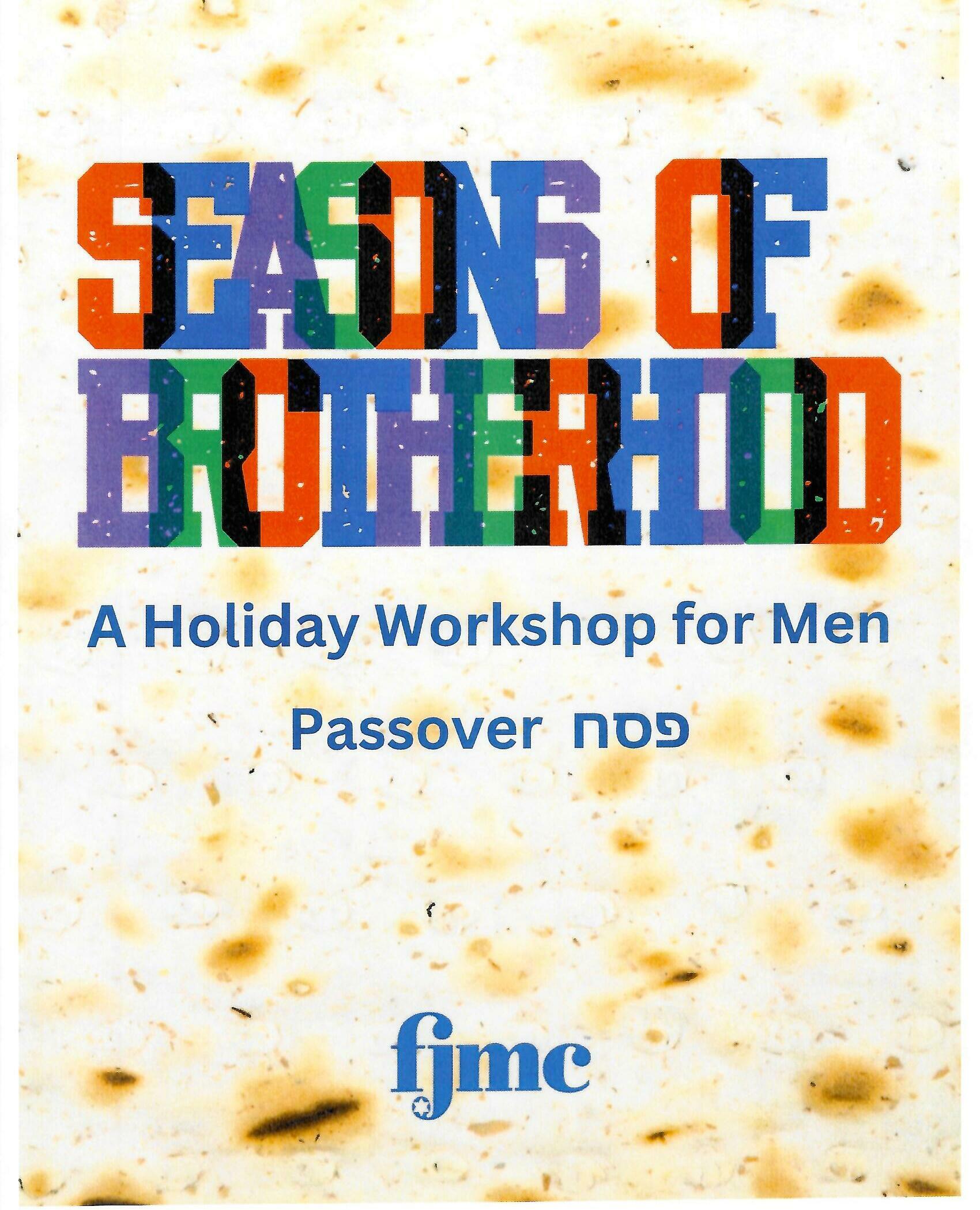

by Rabbi Noam Raucher, MA.ed
SEASONS OF BROTHERHOOD
Reflective Inner Work Through the Seder Experience.
by Rabbi Noam Raucher, MA.Ed – Executive Director, FJMC
This unique workshop is designed to help men explore their inner lives, relationships,
and personal growth through the themes and symbols of Passover. Using reflection,
a hevrutah (study partner), and group discussions, participants will draw connections between the ancient story of Exodus and their modern experiences as
men.
Through this journey, we will engage with Passover’s timeless messages of liberation, transformation, responsibility, and hope while fostering a deeper sense of self-
awareness and community.
Goals of the Workshop
The Facilitators
Your Role:
Preparation:
Facilitation Tips:
Feel free to use this material as us see fit.
Download the PDF version, Seasons of Brotherhood.
SEASONS OF BROTHERHOOD
Reflective Inner Work Through the Seder Experience
For Participants
What to Expect:
Guidelines for Engagement:
Workshop Flow
1. Welcoming, Setting Intentions, and Ice-Breaking.
2. The Four Questions: Exploring personal inquiries and guiding principles.
3. Seder Plate Symbols: Reflecting on life’s bittersweet and transformative
moments.
4. Exodus Story: Identifying with characters and themes of liberation and leadership.
5. The Four Sons: Examining masculine archetypes in your life.
6. Crossing the Sea: Setting intentions for your next steps toward personal
freedom.
7. Closing: Sharing insights and a collective blessing.
Final Thoughts
On Passover we are taught that freedom is both an individual journey and a collective
responsibility. By engaging in this workshop, you are stepping into a sacred space to
reflect on your own journey while supporting others on theirs. Together, we can draw inspiration from this ancient story to navigate the complexities of modern
masculinity with wisdom, compassion, and strength. Let’s begin this journey of
discovery and transformation together.
SEASONS OF BROTHERHOOD
Reflective Inner Work Through the Seder Experience
Objective:
This workshop will use the themes, symbols, and characters of Passover to facilitate meaningful self-reflection, peer bonding, and group discussions. It will explore themes of liberation, transformation, and leadership within the context of the male
experience today.
Part 1 – Welcoming, Setting Intentions, and Ice-Breaking (15 minutes)
1. Welcome and Intentions:
Briefly introduce the purpose of the session. Share how Passover’s themes— freedom, responsibility, and transformation—can help men reflect on their personal and communal lives.
2. Icebreaker Activity:
Ask participants to share their “personal Exodus” in one sentence—something they have freed themselves from or are working to escape.
Part 2 – The Four Questions and the Search for Meaning (15-20 minutes)
Theme: Inquiry and curiosity as pathways to self-discovery.
1.Individual Reflection:
Reflect on and write down four questions (space below) that trouble you or guide your life today. Use the traditional Four Questions as inspiration. Or, consider these examples: What’s different now? What am I holding onto?
What do I hope to become free from? How do I stay grounded during change?
2. Hevrutah Discussion:
Share your questions with a partner. Discuss what these questions reveal
about your current challenges or aspirations.
3. Group Activity:
Share one question from your partner that resonated with you in a circle
discussion.
Use the space below to write your four questions
1.
2.
3.
4.
SEASONS OF BROTHERHOOD
Reflective Inner Work Through the Seder Experience
Part 3 – The Symbols of the Seder Plate (15-20 minutes)
Theme: Personal reflection through tangible metaphors.
1. Interactive Symbol Exercise: (Supplies needed: Fully prepared seder plate)
a. Examine the items on the Seder plate. Assign personal meanings to each:
i. Maror (bitter herbs): A source of current bitterness in your life.
ii. Charoset (sweet-sticky): Something sweet/grounding despite challenges.
iii. Karpas (parsley): A symbol of growth or renewal.
iv. Zeroa (shank bone): A strength you’ve drawn on recently.
v. Beitzah (egg): A symbol of a new beginning.
2. Hevrutah Reflection:
a.Share one symbol and its personal meaning with a partner.
3. Group Activity:
Discuss how the symbols reflect both collective male experiences and unique
personal journeys.
Part 4 – The Story of the Exodus (15-20 minutes)
Theme: Liberation, responsibility, and leadership.
1. Story Reflection: (Supplies needed: Brief descriptions of each character)
a. Choose a character in the Exodus story that you resonate with: Moses, Pharaoh, Aaron, Miriam, or an unnamed Israelite. Reflect on the following questions:
b. How does this character represent aspects of my own journey?
c. What do I learn from their challenges or choices?
2. Hevrutah Exercise:
Share your character choice with your partner and discuss how this lens changes your perspective on your role in family, work, or community.
3. Group Discussion:
Discuss themes of leadership and how men today can embody liberation and
responsibility in their roles.
SEASONS OF BROTHERHOOD
Reflective Inner Work Through the Seder Experience
Part 5 – The Four Children (15-20 minutes)
Theme: Exploring different aspects of masculinity.
1.Reflection Exercise: (Supplies needed: Text and images of the four children)
a. Read and view the descriptions and artwork of the Four Children: Wise,
Wicked, Simple, and the One Who Does Not Know How to Ask. Reflect on:
i. Which child represents me most right now?
ii. How do I balance these archetypes in my life?
2.Hevrutah Discussion:
Share your reflections with a partner, exploring how these archetypes influence your decisions, relationships, and growth.
3. Group Activity: (Supplies needed: Large-size paper and markers)
Create a shared mural or chart that reflects how these archetypes show up in
the group. Discuss how men can support each other in embracing and balancing these traits.
Part 6 – Crossing the Sea (5-10 minutes)
Theme: Taking the next step toward personal freedom.
Part 7 – Closing (5 minutes)
1. Group Sharing:
a. Each participant shares one insight or takeaway from the session.
2. Blessing and Farewell:
End with a collective blessing for strength, wisdom, and community as everyone embarks on their personal and communal journeys.
Need technical or website help? Email us at
Copyright © 2026 FJMC International. All rights reserved. Website designed by Addicott Web. | Privacy Policy